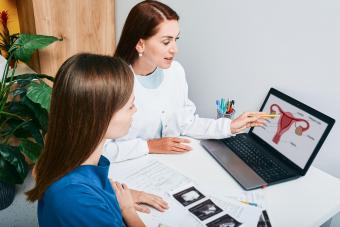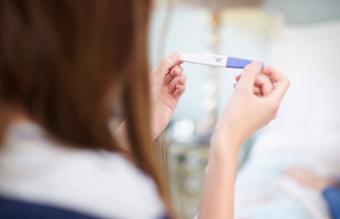
Ovulation during your period is unlikely if you have normal 28-day cycles. However, if you have irregular or shorter cycles, it is possible to ovulate during your period, although it is quite rare.
How Is Ovulation During Your Period Possible?
While these scenarios are rare, there may be some truth to the fact that ovulation can occur during your period.
Shorter Cycles
If you tend to have shorter than average cycles, you may ovulate earlier as well. If your period lasts longer during these short cycles, there is a chance you can ovulate while you're still bleeding.
Irregular Cycles
If you tend to have irregular cycles, it may be hard to predict ovulation and you may ovulate early. If your periods tend to run longer when you do get them, ovulation may occur while you're still bleeding.
Mid-Cycle Bleeding
If you have irregular cycles, you may experience bleeding that is actually breakthrough bleeding or mid-cycle ovulatory bleeding. You may mistake this as a period, but you are actually ovulating.
Sperm Survival
If you have longer periods and have intercourse on the last day or so that you were bleeding, there is a chance of pregnancy. If you ovulate soon after your period and since sperm can live up to five days in the reproductive tract, there's a chance conception could take place.
Do Not Use Your Period As a Form of Birth Control
Keep in mind, the chances that conception can occur during a period is relatively low. It is important to remember, though, that the hormonal makeup of each individual is unique and, because of this, the possibility of pregnancy during a period is very real. Because of this fact, it is not advised to use your period as a possible means of birth control. If you do, you may actually be risking a possible pregnancy. So, do not assume just because you have your period that you can't get pregnant.
The Ovulation Process
Understanding the ovulation process as it relates to the menstrual cycle is important. Your menstrual cycle can actually play a huge role in determining your ovulation date.
Timing
Ovulation occurs when the ovary releases an egg, which typically occurs around day 14 of your cycle. This timing is generally based on a 28-day cycle, but this cycle can vary from month to month. For some women, irregular periods are a fact of life, so narrowing down the exact time of ovulation each month can be tricky.
What Happens
Once ovulation has occurred, the egg travels through the fallopian tube to the uterus. If the egg joins with a sperm, fertilization could occur; however, an unfertilized egg will eventually be shed during a woman's next period. The act of ovulation itself can also produce some bleeding, which is often mistaken for menstruation. Bleeding during ovulation may be caused by the rapid hormone change during the ovulation process.
Can a Woman Ovulate Twice in One Cycle?
Can you ovulate twice in one cycle? A woman can ovulate twice or have multiple ovulations in one cycle. This is when two or more eggs are released during a 24-hour time period. When this happens, there is a chance of conceiving fraternal twins. This may actually occur in 5 to 10 percent of all cycles. However, due to a type of miscarriage called "vanishing twin syndrome" the double ovulation or multiple ovulations in a cycle don't always result in a twin pregnancy.
Important Facts
Finally, understanding a few important facts can clear up some of the confusion surrounding the ovulation process, especially as it relates to the menstrual cycle.
- Typically, only one egg is released during ovulation.
- An egg can live up to 24 hours after ovulation.
- Stressful situations, illness, or other outside influences can affect ovulation.
- It usually takes 7 to 12 days for a fertilized egg to become implanted.
- It is possible to experience ovulation even without experiencing a period.
- While it is common not to be aware that you are ovulating, some women experience a heaviness or some pain during ovulation.
- The chance of pregnancy increases if intercourse occurs sometime in the six day fertile window, which is five days prior to ovulation and the actual day of ovulation.
If You Need More Information
For more information on this topic or if you have other questions concerning menstruation, ovulation, and pregnancy, please contact your physician. The possibility that ovulation might happen during a period might be rare, but it certainly can happen.







